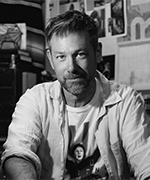by Jason Emde
The alarms started at 11:34 p.m. on July 9, 1945. My wife Maho’s grandmother and great-aunts were in bed under their mosquito nets. Disdaining the shabby bomb shelter in the backyard, they ran for the relative safety of Gifu’s eastern hills with futons on their backs, protection against sparks, debris, and American napalm. Most of the people who fled west died. The raid lasted thirty minutes, destroyed 70 percent of the city, left 100,000 citizens homeless, and killed 900. I always thought that Gifu Castle, overlooking the city from Mt. Kinka, was destroyed in the raid that night, but it had burned down two and a half years earlier. An accident.
Sirens, B-29 Superfortress hum, an uproar of fire eating the city. The sky going bang, going boom. Black foaming smoke. Scream-light. Parents, waterless, urinating on their scorched babies. See this. Remember this.
When Maho’s grandmother and great-aunts returned from the hills their house was gone, their twenty chickens were dead, and all the rice bowls were broken. Imagine the smell. Imagine American pilots in their triumphant, or relieved, or guilty cockpits. Imagine Maho curled in the future, a bean of possibility. Our sons, Joe and Sasha, curled inside her. Maho’s grandmother, Hisako, washing ash out of her hair.
On July 10th the sun came up on an incinerated city, a chaos of smoking ruins. The streets where I walk, now, Keyaki-dori with its arching elms, the parks where Joe and Sasha brawl and run—“Dada, I’ve got a crunch!” yells Joe, meaning cramp—the station, Kogane Shrine, Inaba Shrine, downtown, all: blackened, roasted. Cinders and embers and ash. An ocean of ash. The scrape of shovels applied to ashy heaps. The Nagara River flowing with its cargo of ash to the sea.
I ask Hisako if she hated the Americans, then or now, for destroying her city. “No,” she says. What about the Japanese government? Again: no.
When the Americans firebombed Tokyo that March their incendiary devices boiled the Sumida River. The heat coming off the burning city was so intense it flipped planes over, puffed bombs back up into their bays. A city made of wood and paper. One hundred thousand dead. The ruthless planning in offices, far away.
My maternal grandfather, William Scythes, known to us later as Poppie: wounded during training in England. No D-Day for him. My father, walking among the headstones at the Canadian cemetery at Bény-sur-Mer in Normandy, reading the names of the young men from my grandfather’s regiment, the Regina Rifles, killed on the beaches, killed in French fields. My mother, and me, fluttering in the future, saved by mortar shrapnel. Imagine this.
Gifu Castle was rebuilt in concrete in 1956. Maho often climbs up to it on her day off, for exercise and shinrin-yoku, which translates as forest bathing and is a method of decreasing the activity of the sympathetic nervous system by connecting deeply with nature. Trees, oceanic, or still. Deep green spaces. Path-dapple. My wife, alive in the trail’s quiet.
We take visitors—friends from Tokyo or Nagoya, my brother and his wife and two-year-old son, my sister, my dad—up Mt. Kinka to the castle all the time. Joe and Sasha like Squirrel Village and the ice cream stand up there. Inside the castle are swords, suits of armour, a black lacquer saddle with mother-of-pearl inlay, portraits of long-dead warlords. Nothing about the most recent war that shattered Japan, nearly killed my wife’s grandmother, nearly erased my sons.
Scorched stone lanterns, survivors of the bombing, are visible in the grounds of Meiji Kannon temple, just down the street from Maho’s and my first apartment. The orange gate, the guardian gods. Candles guttering in the case by the altar. The rope, the bell. Stand, and remember.
Gifu was a wartime centre for the manufacture of fu-go, hydrogen balloons with attached explosives that sailed the jet stream over the Pacific to North America where, it was hoped, they’d kill Americans and burn up forests and farms. Over 9000 fu-go were launched for the three day trip at 30,000 feet. I remember my dad telling me about them at Fort Rodd Hill outside Victoria during a summer holiday trip to Vancouver Island when I was a kid. Victoria, where William Scythes and his wife Florence, my Nanie and Poppie, lived. Victoria, where my parents met. Fort Rodd Hill: established for coastal defence. Canadian soldiers scanning the sea for Japanese submarines, scanning the sky for balloons bringing fire.
The fu-go project, inefficient and expensive, was discontinued in April 1945. Three months later the Americans tested their secret atomic project in New Mexico.
Hisako, dismissing heroes, victims, and perpetrators with a shrug.
A castle on Mt. Kinka, overlooking Gifu, since 1204. Imagine the wood and paper city below, caliginous with cooking fires, whisper-circled by the Nagara River. Imagine the flow of armies back and forth, the horses and armour, battle pendants fluttering. Imagine the families, the struggle for survival. Remember this.

Jason Emde’s a teacher, writer, amateur boxer, Prince enthusiast, and graduate student in the MFA Creative Writing program at the University of British Columbia. He’s also the author of My Hand’s Tired and My Heart Aches (Kalamalka Press, 2005) and the co-author of the parodic action novel The Crunch Gang Meet the Deadly Zombie Ninjas of Japan (Amazon e-book, 2018). His work has appeared in Ariel, The Malahat Review, Anastamos, Oxmag, Miracle Monocle, Prometheus Dreaming, Panoply, Cleaver, and Soliloquies Anthology. He lives in Japan with his wife, Maho, and their sons, Joe and Sasha.
